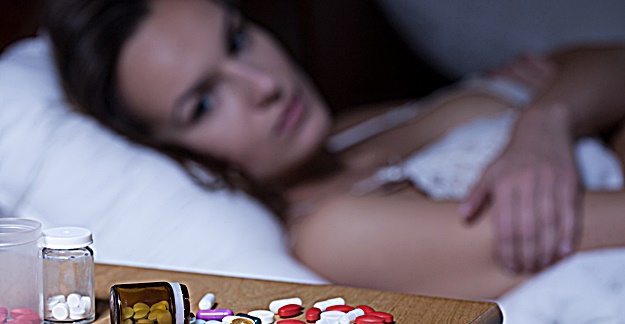Roughly four percent of Americans are taking a Prescription and over-the-counter (OTC) sleep aids are among the most widely used medicines. Their popularity has been spurred by aggressive marketing over the last decade, but also by changes in our culture that have disrupted good sleep habits (TVs, computers, smartphones, the Internet, etc.) and exacerbated matters for people prone to clinical insomnia (work and life stress, economic displacement).
Much has been written about this issue and the drugs themselves, with lots of hand-wringing and popular advice. But for the past two decades, physicians and public health officials mostly went with the societal flow — acceding to the growing demand for and use of prescription and OTC sleep aids.
But that has begun to change. More and more research and data show that these medicines are being abused, overused, and unwisely prescribed — and there are better solutions.
In an analysis of studies from the Agency for Healthcare Research and Quality (AHRQ), a federal government entity, researchers found cognitive behavioral therapy for insomnia (CBT-I) to be a more consistently effective way to combat chronic and intermittent insomnia over the long term compared with any insomnia or sleep medicine. (More about CBT-I below.)
The American Academy of Sleep Medicine, an organization of sleep medicine specialists, recommends that treatment for chronic insomnia should begin with CBT-I, and that when short-term prescription sleep aids are used they should be supplemented with CBT-I.
The American College of Physicians also recommends that patients receive CBT-I as initial treatment for chronic insomnia. If CBT-I alone isn’t successful, then doctors should discuss the benefits, harms and costs of short-term medication use with patients to decide whether to add medications.
The problem is that both the prescription and OTC sleep drugs are intended for short-term use(if they haven’t helped in a week to 10 days people should be evaluated by their doctor) but are being widely used over long periods. An analysis by Thomas Moore of the Institute for Safe Medication Practices found, for example, that two-thirds of people taking the sedative-hypnotic drug zolpidem (generic Ambien) used it for weeks, months or even years.
Overprescribing: Do You Really Need to Take That Med?
While that analysis focused on Ambien, the same problem likely exists for other sedative-hypnotics such as Lunesta (eszopiclone) and Sonata (zaleplon).
Such long-term use has been associated with psychological addiction and a heightened risk of morning drowsiness, falls and accidents. But serious problems can occur even after the first dose of prescription sleep meds. In 2019 the FDA took a strong stance against some of the more severe of these side-effect risks by mandating a boxed warning — the most prominent cautionary labeling — be added to the prescribing information and the patient medication guides for Ambien, Lunesta, and Sonata. The FDA was compelled to make this update after several reports of rare but serious injuries and deaths occurring from a variety of so-called “complex sleep behaviors,” like sleepwalking, sleep-driving, or using a stove, following the use of these medicines. These effects have been highlighted in numerous court cases surrounding fatal and non-fatal auto and other kinds of accidents. (See MedShadow TV: Insomnia Drugs)
In addition, Moore’s analysis found that one in five people who took Ambien combined it with an opioid. That combination vastly increases the risk of dangerous side effects and even potentially fatal depression of the central nervous system.
A study in the Journal of Clinical Sleep Medicine compared mortality risk over a recent 13-year period in people who took prescription sleep meds versus those who did not. Researchers reviewed the health insurance records of about 180,000 adults who took sleep meds and 320,000 people who didn’t and found that people taking sleep meds were significantly more likely to die (information on the cause of death was unavailable) during the study period. Specifically, people who took Ambien were 59% more likely to die than non-users.
In a March 2020 study in the journal Scientific Reports, researchers found an increased risk of suicide 6.7 years or more after patients took their first dose of Ambien. Those in the long-term Ambien group were twice as likely to commit suicide compared to those who never took the drug.
The good news: Prescriptions for these medicines are declining amid attention to their downsides and risks. According to Express Scripts’ 2020 report AMERICA’S STATE OF MIND: U.S. Trends in Medication Use for Depression, Anxiety, and Insomnia, the use of sedative-hypnotics for insomnia has declined 11.3% since 2015. The most commonly used prescription sleep meds included Lunesta, Ambien and Sonata, with the highest use among women aged 45 to 64.
The COVID-19 pandemic brought a blip to this downward trend, however. Early 2020 saw a 14% increase in prescriptions for these drugs.
OTC Insomnia Drugs
As for the OTC sleep drugs, they can hook you as well, according to medical experts and Consumer Reports. There are dozens of kinds, but the big sellers are Advil PM, Nytol, Simply Sleep, Sominex, Tylenol PM, Unisom SleepMinis, and ZzzQuil, from the makers of NyQuil.
The active ingredient in all these drugs is diphenhydramine, a decades-old antihistamine used as a remedy for seasonal allergies. It works by blocking the histamine receptors in the brain that control wakefulness, so drowsiness is a side effect for most people.
The packaging on these medicines suggests they are “non-habit-forming” when used as directed — that is, for short periods. And the FDA requires the package inserts to tell consumers to see their doctor if insomnia persists for more than two weeks.
But a Consumer Reports survey of 4,023 adults found a troubling trend: Of the 20% who took an OTC sleep aid within the past year, one in five said they took it on a daily basis and 40% said they used the drugs for a year or longer.
That’s a problem for many reasons. Diphenhydramine can cause constipation, confusion, dizziness, and next-day drowsiness, according to the FDA. In a 2018 Consumer Reports survey, 40% of people taking an OTC sleep med reported feeling drowsy or foggy the next day. Also of concern: the “hangover effect”— impaired balance, coordination, and driving performance the day after you’ve taken the drug, heightening the risk for falls and accidents. In the Consumer Reports survey, 10% of people taking sleep meds reported feeling uncoordinated, tripping or falling.
Diphenhydramine can also create psychological dependence, Carl W. Bazil, MD, PhD, director of the epilepsy and sleep division at Columbia University’s department of neurology, told Consumer Reports. “The pills are not ‘addictive’ in the physical sense,” he says, “but there can certainly be a risk for psychological dependency.”
So, What to Do?
If your sleep problems persist beyond 14 days or so, it’s time to see your doctor. If he or she is up on the latest research, you may be cautioned to minimize the use of prescription and OTC sleep medicines. Instead, he or she may direct you to a sleep clinic or therapist (usually a psychologist or clinical social worker, not necessarily a medical doctor) who does cognitive behavioral therapy for insomnia, or CBT-I. (See MedShadow’s How to Kick Insomnia Without Turning to Pills and Psychotherapy, Not Sleeping Pills, Best for Insomnia)
CBT-I aims to change the way you think about and approach sleep, and your habits of going to bed and getting to sleep. Various techniques are used. Typically, after a full assessment, you’ll be advised not to watch TV in bed, coached to go to sleep and get up at the same time every day, and taught relaxation and meditation techniques.
Related emotional and life problems will also be discussed, but usually just as they relate to your sleep patterns and troubles. If your insomnia has been triggered by a life event or by depression or anxiety — as is common — you’ll typically be referred to a counselor or psychotherapist. CBT-I involves, initially, three to six one-hour sessions.
A 2018 study in the Journal of Thoracic Disease reported that CBT-I helps 70% to 80% of patients with insomnia, with 40% to 60% maintaining these benefits over long term follow up. The AHRQ analysis found that CBT-I shortened the time people with chronic insomnia fall asleep by 12 to 40 minutes, and added 20 to 45 minutes of total sleep time.
And CBT-I is not restricted to people with chronic insomnia. Sleep specialists and clinics these days routinely use CBT-I to treat people who have intermittent bouts of insomnia as well. In addition, a review of 37 studies involving 2,189 people found that CBT-I was effective in those with co-existing illnesses and psychiatric conditions, including alcohol dependence, depression, post-traumatic stress disorder, cancer, chronic pain, and fibromyalgia.
The biggest benefit of all: No side effects or risks.
If you still decide to take insomnia drugs, talk to your doctor about the safest way to take them. Never drink alcohol while taking them, and don’t take an extra pill to get back to sleep — doing either can worsen the drug’s side effects.
Also, pay close attention to pill labels and avoid mixing narcotic painkillers with any kind of sleeping pill.
How to Correct Poor Sleep Habits
Habit |
Strategy |
| Watching TV in bed | Don’t. TV viewing is not conducive to calming down. |
| Computer work in bed | Don’t work on a computer at all for at least two hours before going to bed. A tall order for many people, to be sure, but the light emitted from computers, mobile devices, and smartphones (so-called “blue light”) signals daylight to the brain even more than ordinary light bulbs and has been shown in studies to delay falling asleep. |
| Drinking alcoholic or caffeinated drinks or chocolate at night | Alcohol often leads to sleep disruption later in the night and may contribute to awakenings. If you have an insomnia problem, caffeine in drinks and foods like chocolate should be consumed only in moderation and not after midafternoon. |
| Taking medicine late at night | Many prescription and nonprescription medicines can delay or disrupt sleep. If you take any on a regular basis, check with your doctor about this. |
| Big meals late at night | Not ideal, especially if you are prone to indigestion or heartburn. Allow at least three hours between dinner and going to bed. |
| Smoking at night | Don’t smoke for at least three hours before going to bed. (Better yet, quit.) |
| Lack of exercise | Just do it! Regular exercise promotes healthy sleep. |
| Exercise late at night | A no-no. Allow at least four hours between exercise and going to bed. It revs up your metabolism, making falling asleep harder. |
| Busy or stressful activities late at night | Another factor that will raise your alertness. Stop working or doing strenuous housework at least an hour before going to bed. The best preparation for a good night’s rest is unwinding and relaxing. |
| Varying bedtimes and wake-up times | Going to sleep at widely varying times – 10 p.m. one night and 1a.m. the next, for example – disrupts optimal sleep. The best practice is to go to sleep at about the same time every night, even on weekends, and wake up about the same time every day, with not more than an hour’s difference on weekends. |
| Spending too much time in bed tossing and turning | Solving insomnia by spending too much time in bed is usually counterproductive; you’ll only become more frustrated. Don’t stay in bed if you are awake, tossing and turning. Get up and do something relaxing, such as reading, until you are ready to go to sleep. |
| Late-day napping | Naps can be wonderful, but should not be taken after 3 p.m. because they can disrupt your ability to get to sleep at night. If you have sleeping problems, it may be best to avoid napping altogether. |
| Poor sleep environment | Noise, a room that’s too hot or not dark enough, an uncomfortable bed, covers, or pillow – all can prevent a good night’s sleep. Solve those problems if you have them. |






